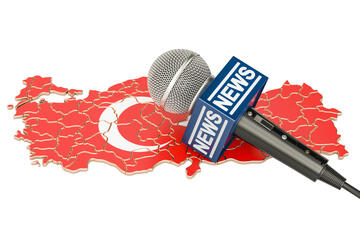
Credits: AlexLMX/ Shutterstock
Suppression of media denies public access to information and undermines legitimacy of electoral process
The International Press Institute (IPI) and 19 press freedom, freedom of expression and human rights organizations call on Turkey’s broadcast regulator (RTÜK) to immediately stop fining broadcasters for their critical reporting. Journalists and broadcasters must be allowed to do their jobs of informing the public over critical issues and holding the government to account.
Instead of upholding freedom of expression and media pluralism in the country, RTÜK is being weaponized by the governing parties to silence legitimate criticism and provide them with an unfair advantage in the May 2023 elections. This suppression of public debate is undermining the electoral process.
On April 5, 2023, İlhan Taşcı, a CHP-nominated member of the Radio and Television High Council (RTÜK), reported on Twitter that RTÜK had once again fined several news channels over critical content.
FOX TV was fined three percent of its monthly ad revenue after news anchor Gülbin Tosun criticized the government’s approach to women’s rights by saying “the ruling alliance does not want you to work or study, but to have babies and stay at home” during a live broadcast. Tosun had been targeted by members of the ruling AKP party, following her comments.
RTÜK imposed the same penalty on Halk TV for “preventing the free formation of opinion” after a presenter and her guest cited a news article claiming that Turkey's Disaster Management Authority (AFAD) had charged earthquake survivors to hire out its machinery to help rescue their relatives from the rubble.
TELE1 was also fined three percent of its monthly ad revenue for “humiliating a municipality” after the hosts of “18 Dakika” program criticized the AKP-ruled Şanlıurfa Municipality and cited allegations that the municipality had transferred funds, provided by foreign governments to Turkey, to the Taliban in Afghanistan.
These fines come on the back of a series of penalties already issued in February 2023 imposed on Halk TV, TELE1, and FOX TV and in March 2023 against Halk TV, TELE1, FOX TV, Show TV, and Yıldız EN TV. RTÜK also imposed temporary bans on numerous programs because of their critical coverage.
In 2022 RTÜK issued 54 penalties to five independent broadcasters totalling 17.335.000 Turkish Lira (approximately 823.000 Euros) of fines. By contrast, pro-government channels received a total of four penalties totalling 1.674.000 TL (approximately 80.000 Euros).
The government’s censorship is not limited to domestic news channels as, earlier in March 2023, the Ministry of Industry and Technology did not renew the operating license of German broadcaster Deutsche Welle’s (DW) Turkish service after it was blocked in June 2022 at the request of RTÜK. DW is no longer able to operate in Turkey as a legal entity, forcing its reporters and editors to continue working as freelancers, deprived of stable work contracts and social security benefits.
We view these incidents as part of the Turkish government’s systematic attempt to stifle critical reporting and to control the information flow ahead of Turkey’s presidential and parliamentary elections on May 14, 2023.
We call on the Turkish broadcast regulator, RTÜK, to immediately end the persecution of independent broadcasters and act according to its mandate to secure freedom of expression and media pluralism in the country.
Signed by:
International Press Institute (IPI)
Association of European Journalists
ARTICLE 19
Articolo 21
Coalition For Women In Journalism (CFWIJ)
Committee to Protect Journalists (CPJ)
Danish PEN
English PEN
European Centre for Press and Media Freedom (ECPMF)
European Federation of Journalists (EFJ)
Freedom House
International Federation of Journalists (IFJ)
Media and Law Studies Association (MLSA)
OBC Transeuropa (OBCT)
PEN International
Platform for Independent Journalism (P24)
Reporters Without Borders (RSF)
South East Europe Media Organisation (SEEMO)
Swedish PEN
World Association of News Publishers (WAN-IFRA)
Tags: Turkey Public broadcasting Political pressure
This content is part of the Media Freedom Rapid Response (MFRR), a Europe-wide mechanism which tracks, monitors and responds to violations of press and media freedom in EU Member States and Candidate Countries. The project is co-funded by the European Commission.


